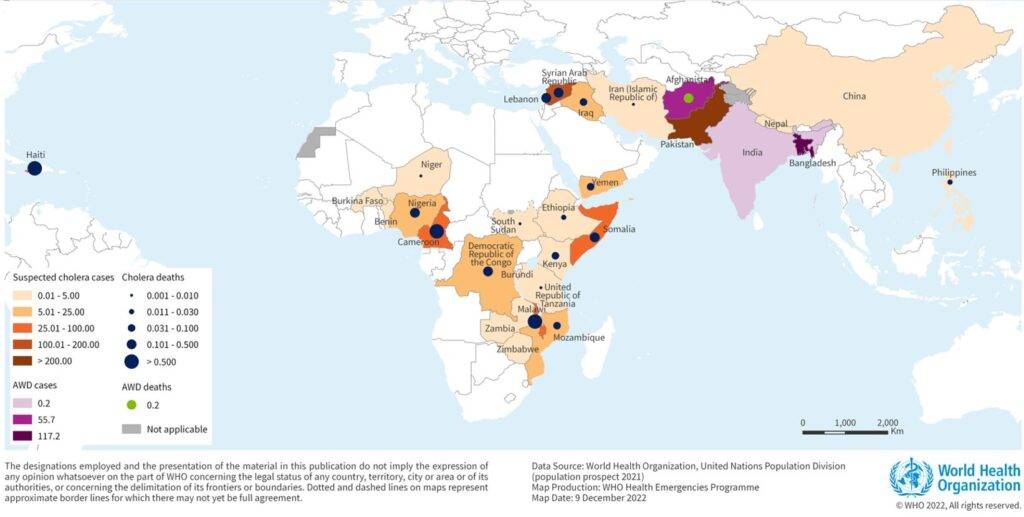Cholera is a potentially life-threatening diarrhoeal illness caused by consuming contaminated food or water. Although rare in the UK, it is still a significant risk in many developing countries — particularly for travellers.
In this article, we explain what cholera is, its symptoms, causes, treatment, and most importantly, how you can protect yourself before travelling.
Cholera is caused by the bacterium Vibrio cholerae, which produces a toxin that affects the small intestine, leading to rapid loss of fluids and electrolytes.
It is usually spread through:
Contaminated water supplies
Poor sanitation
Inadequate food hygiene
Raw or undercooked seafood in some regions
Outbreaks are often linked to areas with limited access to clean water or following natural disasters and conflicts.
Cholera is endemic in parts of:
South Asia (especially Bangladesh and India)
Sub-Saharan Africa
Southeast Asia
Haiti and parts of Central America
Some areas of the Middle East
Travellers visiting rural or low-resource settings are at higher risk, particularly where infrastructure is underdeveloped.
Cholera symptoms can appear within 1 to 5 days after exposure and vary in severity. In mild cases, there may be no symptoms at all. In severe cases, it can lead to death within hours without treatment.
Common symptoms include:
Sudden, profuse watery diarrhoea (“rice-water stools”)
Nausea and vomiting
Muscle cramps
Extreme thirst
Rapid heartbeat
Low blood pressure
Severe dehydration
In children, symptoms can progress rapidly and are more dangerous.
Diagnosis is usually made by:
Stool sample analysis
Clinical assessment based on symptoms and travel history
Laboratory confirmation is often used in outbreak settings or hospitalised cases.
Most cases can be treated effectively with:
Oral rehydration salts (ORS) to prevent dehydration
Antibiotics in severe cases to reduce duration of illness
IV fluids if dehydration is extreme
Early treatment is critical and recovery is usually fast with proper care.
Cholera is highly preventable, especially with a combination of vaccination and safe hygiene practices.
We offer the oral cholera vaccine (Dukoral) at our travel clinic in Great Yarmouth. This vaccine helps prevent infection by stimulating your body’s natural defences in the gut.
Schedule: 2 doses (1 week apart) for adults
Protection: Up to 2 years
Minimum Age: 2 years
Drink only bottled, boiled, or treated water
Avoid ice in drinks
Eat food that is thoroughly cooked and still hot
Avoid raw salads, shellfish, and fruit unless peeled by yourself
Wash hands regularly with soap or use alcohol hand gel

The cholera vaccine is recommended for:
Travellers to remote or high-risk areas
Humanitarian workers
Volunteers in refugee camps or disaster zones
People with underlying health conditions or weakened immune systems
It may also be required by some employers or organisations for travel clearance.
Cholera remains a real health threat in many parts of the world, but it is entirely preventable. Whether you’re travelling for work, volunteering, or tourism — protecting yourself with the cholera vaccine is a safe and effective step.
We offer the Dukoral cholera vaccine at our private travel clinic in Gorleston, Great Yarmouth, covering the local area and 30-mile radius including Lowestoft, Norwich, Beccles, Hemsby, Hopton, and Caister.
→ Book your appointment online now
NHS UK – Cholera: https://www.nhs.uk/conditions/cholera
Fit for Travel (NHS Scotland): https://www.fitfortravel.nhs.uk/advice/disease-preventions/vaccinations/cholera
WHO Fact Sheet: https://www.who.int/news-room/fact-sheets/detail/cholera
UKHSA Green Book – Cholera: https://www.gov.uk/government/publications/cholera-the-green-book
Authored by:

BPharm, MPharm, PGDip (Pharmacy), MRPharmS, IP
Pharmacist Independent Prescriber

Online Chemist
82 Middleton Road
Gorleston
Great Yarmouth
Norfolk, NR31 7AH
Phone: 01493 600610
Email: info@onlinechemistuk.net
Superintendent Pharmacist:
Obaidullah Zaman
BPharm, MPharm, PGDip (Pharmacy), MRPharmS, IP
GPhC Reg. Number: 2083409
Pharmacy Premises GPhC Reg. Number: 9011159
Monday 09:00 – 17:00
Tuesday 09:00 – 17:00
Wednesday 09:00 – 17:00
Thursday 09:00 – 17:00
Friday 09:00 – 17:00
Saturday Closed
Sunday Closed
Click here for driving directions
OnlineChemist is a trading name of Nomaz Limited.
Registered in England – 11349276.
© 2025 All rights reserved.